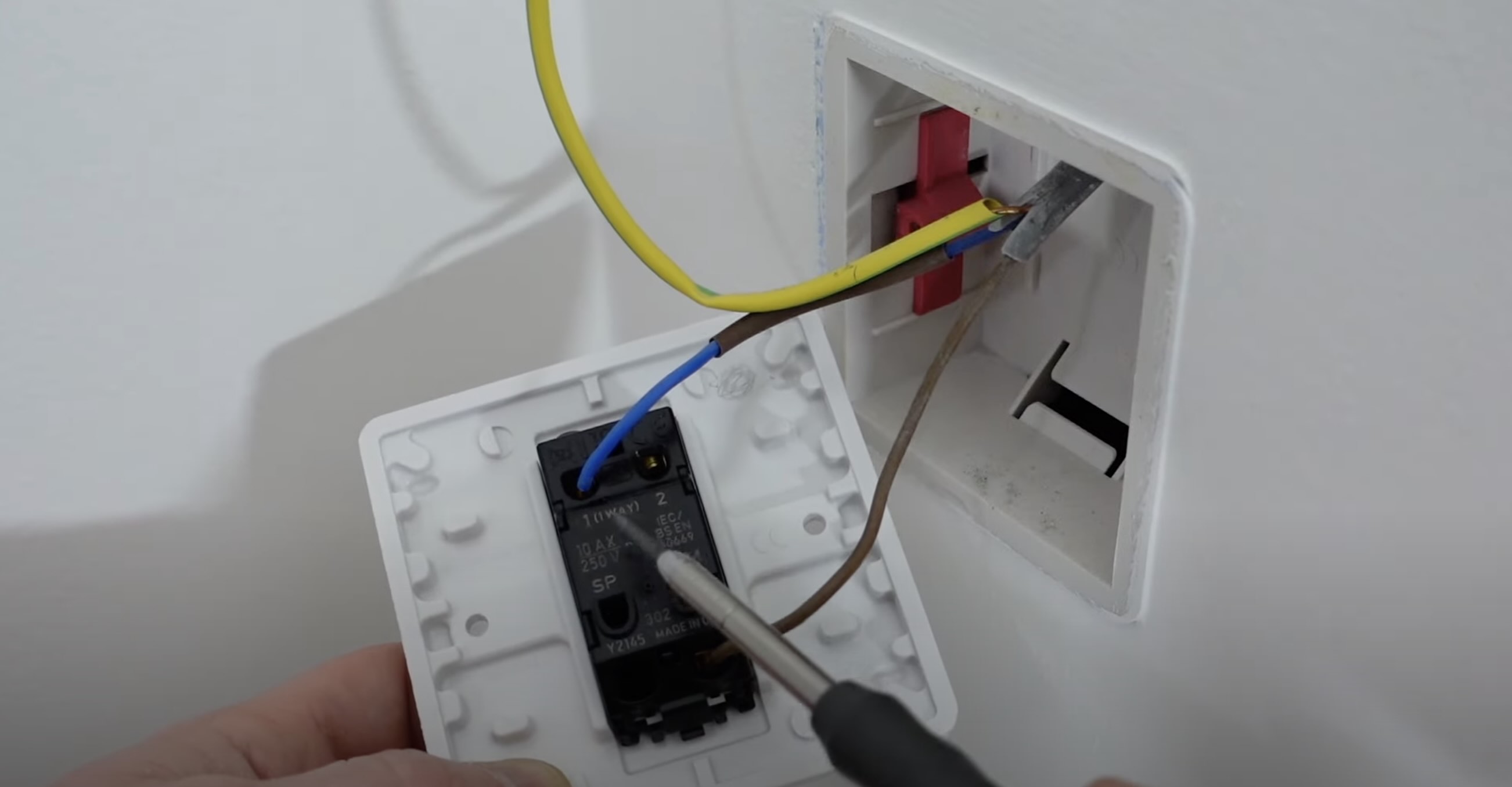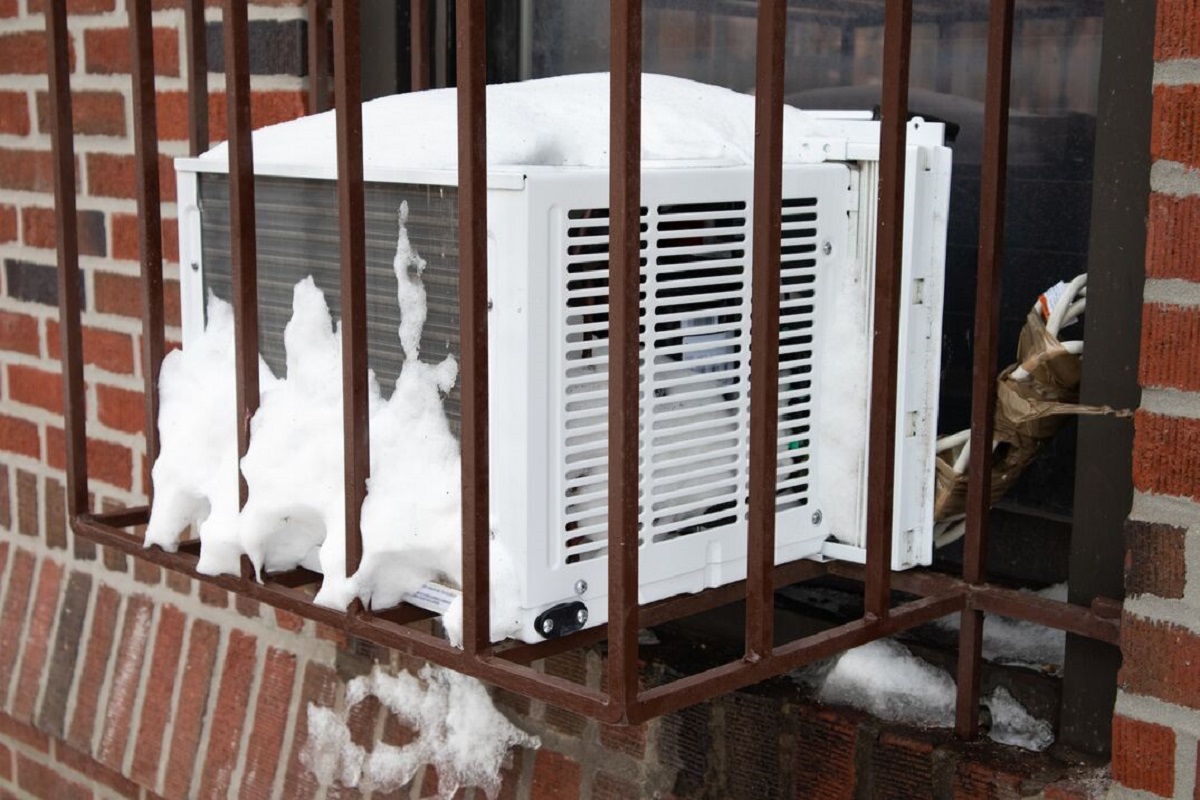

Articles
Why Is There No AC In The Uk
Modified: January 20, 2024
Discover why air conditioning is not common in the UK and explore informative articles about this topic.
(Many of the links in this article redirect to a specific reviewed product. Your purchase of these products through affiliate links helps to generate commission for Storables.com, at no extra cost. Learn more)
Why Is There No AC In The UK
The absence of air conditioning (AC) in the United Kingdom is a perplexing phenomenon, especially when considering the extreme heatwaves experienced in recent years. In countries with similar climatic conditions, AC is a standard feature to combat high temperatures, but in the UK, it is not the norm. So, why is there no AC in the UK?
Read more: Why Is My Outdoor Bamboo Dying In The UK
Historical Perspective
One of the reasons can be attributed to traditional British architectural design and construction. Historically, buildings in the UK were designed to withstand the mild and temperate climate. The emphasis was on insulation to keep the cold out rather than cooling the interior during hot weather.
Climate and Weather Patterns in the UK
The UK has a maritime climate characterized by mild summers and cool winters. Average temperatures rarely reach extreme highs, making AC less of a necessity when compared to countries with hotter climates. While heatwaves do occur, they are usually short-lived, and the British tend to adapt by seeking shade, opening windows, and using fans rather than installing AC units.
Cultural Factors
The British approach to weather also plays a role in the absence of widespread AC. The British are known for their resilience and “keep calm and carry on” attitude, even in adverse weather conditions. There is a cultural preference for natural ventilation and open windows to let in fresh air instead of relying on mechanical cooling systems.
Additionally, there is a strong emphasis on energy conservation and sustainability in the UK. As AC units consume a significant amount of energy, there is a desire to minimize their usage to reduce the carbon footprint. This aligns with the UK’s commitment to combatting climate change and achieving net-zero carbon emissions.
Building Infrastructure and Design
The age and structure of buildings in the UK pose challenges for the retrofitting or installation of AC units. Many historic buildings, especially those in cities like London, are protected and subject to strict regulations, making it difficult to modify their exteriors. Additionally, the narrow streets and limited space in urban areas can make the installation of outdoor condenser units impractical.
For new construction projects, there is a growing emphasis on environmentally friendly building design, which prioritizes energy efficiency and natural cooling methods. This approach aims to reduce the need for AC by implementing effective insulation, ventilation systems, and passive cooling strategies.
Read more: Why Is The AC Not Cooling
Cost and Efficiency
The economic factor also comes into play in the absence of widespread AC in the UK. Installing and maintaining AC units can be expensive, both for individuals and businesses. Given the relatively limited need for cooling throughout the year, the cost-benefit analysis often favors alternative cooling methods.
In terms of energy efficiency, AC units consume a significant amount of electricity, which impacts both financial costs and environmental considerations. With the UK’s focus on reducing greenhouse gas emissions, alternatives such as fans, evaporative coolers, and efficient HVAC systems have gained more attention as sustainable options for cooling.
Public Opinion and Attitudes
Public opinion and attitudes toward AC in the UK also contribute to its absence. Surveys and studies have shown that many British people perceive AC as a luxury or unnecessary expense. Some even view it as a symbol of excess and wastefulness, particularly when the weather is generally mild.
Overall, the absence of widespread AC in the UK can be attributed to a combination of historical, cultural, economic, and environmental factors. While heatwaves present challenges, the British continue to rely on traditional cooling methods and adaptability. However, as temperatures rise due to climate change, there may be a shift in attitudes and an increased demand for AC in the future.
Why Is There No AC In The UK
Air conditioning (AC) plays a crucial role in hot climates, providing relief from the scorching heat and creating a comfortable indoor environment. In many countries with sweltering summers, AC is a standard feature in homes, offices, and public spaces. However, in the United Kingdom, AC is not as prevalent, despite the increasing frequency of heatwaves and rising temperatures.
Understanding the absence of AC in the UK requires exploring the historical, cultural, infrastructural, and economic factors that contribute to this phenomenon. While hot weather is often associated with the need for cooling, the UK’s unique circumstances have shaped attitudes and practices regarding indoor climate control.
In regions with hot climates, AC is regarded as a essential amenity, providing not only comfort but also health benefits. When temperatures soar, AC helps prevent overheating, dehydration, and heat-related illnesses. It enables people to function efficiently, sleep better, and maintain overall well-being. AC also enhances productivity in workplaces, improves the quality of indoor air, and protects sensitive equipment from heat damage.
However, the UK’s climate is notably different, characterized by mild summers and cool winters. While the country does experience occasional heatwaves, the average temperatures rarely reach extreme highs. This moderate climate alleviates the need for year-round reliance on AC. Instead, during brief periods of hot weather, the British typically adapt by seeking shade, using fans, and opening windows to create cross ventilation in buildings.
Furthermore, the British approach to weather is influenced by cultural factors. The resilient “keep calm and carry on” attitude ingrained in British society encourages adaptation rather than dependence on mechanical systems. The preference for natural ventilation and the use of open windows to let in fresh air is deeply embedded in the British lifestyle.
In addition, conservation of energy and sustainability concerns have played a significant role in the UK’s approach to indoor climate control. The country has committed to reducing its carbon footprint and achieving net-zero carbon emissions. This has led to a focus on energy efficiency and minimizing excessive energy consumption. Given that AC units consume a significant amount of electricity, there is a desire to reduce reliance on AC in order to meet environmental goals.
The age and structure of buildings in the UK also pose challenges for widespread AC installation. Many historic buildings are protected and subject to strict regulations, making it difficult to modify their exteriors. Additionally, limited space in urban areas and narrow streets can make it impractical to install outdoor condenser units. As a result, alternative cooling methods and features, such as effective insulation and passive cooling strategies, are favored.
Financial considerations also come into play. Installing and maintaining AC units can be expensive for individuals and businesses. Given the relatively mild and short periods of hot weather in the UK, the cost-benefit analysis often favors other cooling solutions, such as fans and evaporative coolers.
While the absence of AC in the UK may seem unusual given the increasing frequency of heatwaves, it is a result of various factors, including the mild climate, cultural preferences, conservation efforts, building infrastructure, and economic considerations. The British continue to rely on traditional cooling methods, adapting to hot weather through open windows, fans, and sustainable practices. However, with the changing climate and rising temperatures, the demand for AC may increase in the future.
Why Is There No AC In The UK
Read more: Why AC Not Working
Historical Perspective
Understanding the absence of air conditioning (AC) in the United Kingdom requires considering the historical context and traditional British architectural design and construction practices. The influence of the country’s climate on building practices has shaped the approach to indoor climate control.
Historically, buildings in the UK were designed to withstand the unique weather conditions that define the country’s climate. With the prevailing mild summers and cool winters, the emphasis was on insulation to keep the cold out rather than cooling the interior during hot weather.
The construction of homes and buildings in the UK has traditionally focused on retaining heat and providing comfort during colder months. This approach is evident in the use of materials such as thick walls, double-glazed windows, and insulation to trap heat inside. As a result, traditional buildings in the UK tend to retain warmth well, which can be advantageous in colder weather but can pose challenges during hot summers.
Moreover, the architectural design of buildings in the UK has also been influenced by the need to protect against heavy rain and strong winds. Steep-pitched roofs, overhangs, and the use of durable materials have therefore been customary, which may impact the ease of retrofitting or installing AC systems.
The UK’s temperate climate has historically mitigated the need for extensive cooling systems in buildings. While hot weather events occur, they have been relatively infrequent and transient compared to countries with more severe and prolonged summers.
As a result, British architectural design and construction practices have evolved to prioritize insulation and other methods of keeping buildings warm in colder months. This emphasis on heat retention mitigates the need for extensive cooling capabilities.
Over time, these traditional architectural practices have become deeply ingrained in British culture, influencing the perception and expectations of indoor climate control. The focus on warmth and insulation has created a mindset that favors adapting to hotter weather rather than relying on mechanical cooling systems like air conditioning.
Understanding how historical factors and traditional architectural design have shaped building practices in the UK is key to comprehending the absence of widespread AC. As the climate continues to change and heatwaves become more frequent, there may be a need to reevaluate these practices and consider alternative approaches to indoor climate control.
Why Is There No AC In The UK
Climate and Weather Patterns in the UK
The climate and weather patterns in the United Kingdom play a crucial role in the absence of widespread air conditioning (AC) in the country. Understanding the unique characteristics of the UK’s climate helps explain why AC is not as prevalent as in other regions with hotter climates.
The UK has a maritime climate, heavily influenced by the North Atlantic Ocean and the Gulf Stream. This climate type results in relatively mild summers and cool winters compared to countries with continental or tropical climates. The moderating effect of the Atlantic Ocean keeps temperature extremes in check, limiting the need for extensive cooling systems.
Throughout the year, the UK experiences a range of temperatures depending on the season. In the summer months, average temperatures hover around 15 to 25 degrees Celsius (59 to 77 degrees Fahrenheit) across the country. However, during heatwaves, temperatures can occasionally surge into the high 20s or even reach 30 degrees Celsius (86 degrees Fahrenheit) in some parts of the UK.
While these temperatures may seem warm, they are comparatively lower than those experienced in countries where AC is more prevalent. In regions with hotter climates, summer temperatures often exceed 30 degrees Celsius (86 degrees Fahrenheit) for extended periods, creating a greater need for cooling systems to maintain comfort.
In countries with hotter climates, AC has become an essential part of everyday life, enabling people to escape from stifling heat and create a comfortable indoor environment. However, the relatively mild and less extreme temperatures in the UK have historically allowed the British to adapt to hot weather using alternative cooling methods.
Furthermore, the sporadic nature of UK heatwaves also contributes to the absence of widespread AC. While heatwaves do occur, they are generally short-lived, lasting only a few days or weeks. This temporary nature of extreme heat reduces the urgency to invest in and rely on AC systems compared to regions with longer and more intense periods of hot weather.
Comparing the UK to countries with AC, such as those in subtropical or tropical regions, reveals a stark difference in climate and temperature patterns. Countries like the United Arab Emirates, Singapore, or Australia experience prolonged periods of high heat and humidity. AC systems are essential in these regions to counteract the intense heat and maintain comfort throughout the year.
In summary, the UK’s moderate maritime climate, with relatively mild summers and cool winters, contributes to the absence of widespread AC. The lower average temperatures and shorter heatwave durations make alternative cooling methods and adaptations more feasible, reducing the dependence on mechanical cooling systems like AC. However, as temperatures rise due to climate change, the need for AC may increase in the future.
Why Is There No AC In The UK
Read more: Why Is My AC Fan Not Turning On
Cultural Factors
The absence of widespread air conditioning (AC) in the United Kingdom is also influenced by cultural factors that shape the British approach to weather and indoor climate control. The British have a distinct perspective on weather and a preference for natural ventilation, which contributes to the limited demand for AC.
The British have long been known for their resilience and adaptability in the face of changing weather conditions. Rather than relying heavily on mechanical cooling systems, such as AC, the British tend to embrace a “keep calm and carry on” attitude, adapting to the weather as it comes.
This cultural approach is evident in the British preference for natural ventilation and open windows. The practice of opening windows to let in fresh air is deeply ingrained in British lifestyle and can be traced back to the historical necessity of ventilating homes and buildings for hygienic purposes.
By relying on natural ventilation, the British can take advantage of cooler air during the early morning and late evening, reducing the need for artificial cooling methods. Open windows also create cross ventilation, allowing for the circulation of air and a cooling effect, particularly in areas with a breeze.
In addition to the cultural preference for natural ventilation, conservation of energy and sustainability concerns play a role in the limited demand for AC in the UK. The country has committed to reducing its carbon footprint and achieving net-zero carbon emissions, driving a focus on energy efficiency and minimizing excessive energy consumption.
AC units consume a significant amount of electricity, contributing to a higher carbon footprint and energy usage. As a result, there is a desire in the UK to reduce reliance on AC as a means of aligning with broader environmental goals. This emphasis on sustainability and conservation influences the perception and usage of cooling technologies.
While there may be instances of homes, offices, or public spaces that have AC in the UK, it is often considered a luxury or unnecessary expense rather than a standard feature. The British cultural perspective regarding weather, the preference for natural ventilation, and the focus on energy conservation contribute to the limited demand and usage of AC.
As the effects of climate change become more pronounced and heatwaves become more frequent, attitudes may shift, and the demand for AC in the UK may increase. However, for now, the British continue to rely on traditional cooling methods and adaptability to navigate hot weather, opening windows and embracing the natural ventilation that is ingrained in their culture.
Why Is There No AC In The UK
Building Infrastructure and Design
The absence of widespread air conditioning (AC) in the United Kingdom can also be attributed to the unique building infrastructure and design found throughout the country. The age and structure of buildings, as well as practical considerations for retrofitting or installing AC units, contribute to the limited presence of AC in the UK.
One key factor is the age of many buildings in the UK. The country is known for its rich architectural history, with structures that range from centuries-old historic landmarks to more modern buildings. Older buildings often have solid masonry construction and thick walls that provide insulation and reduce heat transmission. However, this also poses challenges for retrofitting or modifying buildings to accommodate AC systems.
Many historic buildings in the UK are protected and subject to strict regulations to preserve their architectural integrity. These regulations can limit the extent to which modifications can be made to the exteriors of these buildings, including the installation of external condenser units required for AC systems. These limitations make it difficult and costly to retrofit AC in these historic structures without compromising their aesthetic and historical value.
Furthermore, the narrow streets and limited space in densely populated areas like London present additional challenges for AC installation. The cramped urban environment makes it impractical to install external condenser units, which are typically required for traditional central AC systems. The lack of available space and restricted access can hinder the retrofitting process.
In new construction projects, there are also considerations that influence the limited presence of AC in the UK. Increasingly, there is a focus on environmentally friendly and energy-efficient building design. This includes the implementation of passive cooling techniques, effective insulation, and ventilation systems that promote natural airflow.
Designers and architects in the UK explore innovative solutions to minimize the reliance on mechanical cooling systems like AC. By incorporating features such as solar shading, high-performance glazing, and efficient building materials, they aim to reduce heat gain and promote a comfortable indoor environment without the need for extensive AC usage.
Furthermore, the emphasis on energy efficiency and sustainability throughout the UK’s construction industry may discourage the widespread installation of AC systems. AC units consume a significant amount of electricity, contributing to higher energy consumption and associated environmental impacts. The desire to reduce carbon emissions and promote energy conservation aligns with a limited usage of AC in favor of more sustainable alternatives.
In summary, the age and structure of buildings in the UK, along with practical considerations for retrofitting and new construction projects, contribute to the limited presence of AC. The restrictions on modifying historic buildings, limited space in urban areas, and the focus on energy efficiency in building design all influence the approach to cooling in the UK. While AC may be installed in some modern buildings or selectively in specific areas, alternative cooling methods and sustainable design practices remain prevalent.
Why Is There No AC In The UK
Consider investing in portable air conditioning units or fans to help keep your living or working space cool during the warmer months in the UK. These can provide relief without the need for a central AC system.
Read more: Why Is My AC Freezing Over
Cost and Efficiency
The absence of widespread air conditioning (AC) in the United Kingdom can be influenced by economic factors, as well as considerations regarding energy consumption and environmental impact. The costs associated with installing and maintaining AC units, along with the desire for energy efficiency, have contributed to the limited presence of AC in the UK.
One significant factor is the economic considerations involved in AC installation. AC units can be expensive, both in terms of purchasing and installation costs. The initial investment required, along with ongoing maintenance and energy costs, can deter individuals, businesses, and even public facilities from adopting AC systems.
Given the relatively mild summer temperatures in the UK, the cost-benefit analysis often favors other cooling solutions that are more economical in the long run. In many cases, simple and cost-effective alternatives, such as fans, open windows, and natural ventilation, are sufficient to provide comfort during hot weather periods.
Energy consumption and environmental impact are also essential considerations. AC units are known for their high electricity consumption, which can lead to increased energy costs and a larger carbon footprint. The UK has committed to reducing greenhouse gas emissions and achieving net-zero carbon emissions, driving a focus on energy efficiency and conservation.
As a result, there is a desire to minimize excessive energy consumption in buildings, including the usage of AC systems. Energy-efficient alternatives and sustainable cooling strategies are increasingly favored in the UK. These include the implementation of advanced insulation, intelligent building management systems, and the use of renewable energy sources for cooling purposes.
Alternatives for cooling in the UK are diverse and often rely on more energy-efficient methods. Fans provide a cost-effective solution, as they consume significantly less energy than AC units. Additionally, evaporative coolers, which utilize the natural process of evaporation to cool the air, are gaining popularity, particularly in drier regions of the country.
Building designs that facilitate natural cooling, such as passive ventilation systems and solar shading, also contribute to efficient and sustainable cooling in the UK. By reducing heat gain and promoting airflow, these design features reduce the need for artificial cooling systems.
The UK’s commitment to sustainability and energy conservation has also fostered the development of innovative cooling technologies. These include heat recovery ventilation systems, which extract and reuse waste heat, and geothermal cooling systems that tap into the stable temperatures of the ground to provide cooling.
In summary, economic factors, energy consumption concerns, and the desire for energy efficiency have influenced the limited presence of AC in the UK. The costs associated with installation and maintenance, coupled with the UK’s commitment to conservation and sustainability, have driven the adoption of energy-efficient cooling alternatives. While AC may be present in some cases, the focus on cost-effectiveness and environmental impact prompts the exploration of more sustainable and economically viable cooling solutions in the UK.
Why Is There No AC In The UK
Public Opinion and Attitudes
The absence of widespread air conditioning (AC) in the United Kingdom is also influenced by public opinion and attitudes towards AC. Surveys and studies have shed light on the perception of AC among the British population, shaping the limited demand for AC in the country.
Various surveys have shown that AC is not regarded as a necessity in the UK, especially when compared to countries with hotter climates. Many British people associate AC with luxury and view it as an unnecessary expense. This perception is rooted in the country’s temperate climate, where AC is not seen as an essential component of everyday life.
Unlike countries with more extreme heat, where AC is considered a standard feature in both homes and public spaces, the British population has developed alternative strategies to cope with periodic hot weather. The preference for natural ventilation, use of fans, and reliance on traditional cooling methods have become ingrained in the British culture.
The perception of AC as a luxury rather than a necessity is reinforced by the relatively short duration of heatwaves in the UK. Heatwaves in the country tend to be shorter-lived, lasting a few days to a couple of weeks, rather than extended periods of intense heat. As a result, the urgency to install AC systems throughout the country is not as prevalent when compared to regions with longer and more intense summers.
Moreover, the perception of AC as a luxury is also intertwined with perceptions of energy consumption, environmental impact, and sustainability. The British population has become increasingly aware of the need to reduce carbon emissions and conserve energy. AC units are known to consume significant amounts of electricity, leading to concerns about their environmental footprint.
This focus on sustainability and energy conservation aligns with the British commitment to combat climate change and achieve net-zero carbon emissions. As a result, the use of more energy-efficient cooling methods, such as fans and natural ventilation, is favored over AC units, which are seen as energy-intensive and less environmentally friendly.
In summary, public opinion and attitudes towards AC in the UK influence its limited presence in the country. The perception of AC as a luxury or unnecessary expense, combined with a preference for alternative cooling methods and a focus on energy conservation, have shaped the limited demand for AC in the country. As the effects of climate change continue to be felt and temperatures rise, attitudes may shift, leading to an increased demand for AC in the future.
Why Is There No AC In The UK
Read more: Why Does My AC Keep Turning On And Off
Conclusion
As discussed, the absence of widespread air conditioning (AC) in the United Kingdom can be attributed to a combination of factors, including historical, cultural, infrastructural, economic, and environmental considerations. Understanding these factors helps to explain why the demand for AC in the UK is not as prevalent as in regions with hotter climates.
Historically, traditional British architectural design and construction practices focused on insulation to retain heat during colder months, rather than cooling the interior during hot weather. The moderate climate in the UK, characterized by mild summers and cool winters, has allowed the British to adapt to hot weather using alternative methods such as natural ventilation and open windows.
Cultural factors, including the British approach to weather, resilience, and sustainability concerns, have also influenced AC usage. The British have a preference for natural ventilation and adaptability, while also prioritizing energy conservation and minimizing excessive energy consumption.
The age and structure of buildings in the UK present challenges for retrofitting or installing AC units. Historic buildings are protected and subject to strict regulations, and limited space in urban areas makes it difficult to accommodate external condenser units. As a result, alternative cooling methods and sustainable design practices are favored, particularly in new construction projects.
Economic factors, such as the costs associated with AC installation and maintenance, along with considerations of energy consumption and environmental impact, have influenced the limited presence of AC in the UK. The British perception of AC as a luxury or unnecessary expense, combined with a commitment to sustainability, has driven the adoption of energy-efficient cooling alternatives.
The future outlook for air conditioning in the UK is uncertain. As temperatures rise due to climate change and heatwaves become more frequent, there may be an increased demand for AC in the coming years. However, the British resilience and adaptability, as well as their cultural preferences for natural ventilation, may continue to shape the approach to indoor climate control.
Alternative cooling methods that prioritize energy efficiency and sustainability are likely to gain more prominence. These may include fans, evaporative coolers, passive cooling strategies, and innovative technologies that reduce energy consumption and minimize environmental impact.
In conclusion, the absence of widespread AC in the UK stems from a combination of historical, cultural, economic, and infrastructural factors, as well as concerns about energy consumption and sustainability. While AC may have a limited presence in specific cases, the British continue to rely on traditional cooling methods and adaptability. However, as temperatures rise and climate change impacts become more significant, the demand for AC may evolve, leading to a changing landscape of indoor climate control in the UK.
Frequently Asked Questions about Why Is There No AC In The Uk
Was this page helpful?
At Storables.com, we guarantee accurate and reliable information. Our content, validated by Expert Board Contributors, is crafted following stringent Editorial Policies. We're committed to providing you with well-researched, expert-backed insights for all your informational needs.











0 thoughts on “Why Is There No AC In The Uk”